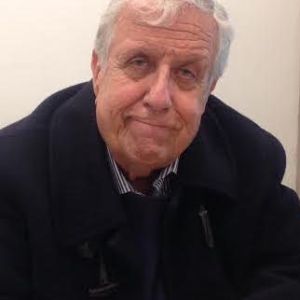Patricio Bañados
Transcription
I joined the “No” campaign because the political parties conducted a marketing study, and despite being banned from television for five years by the dictatorship, I turned out to be the most trustworthy person on television, by far. They told me this themselves; I have never seen the survey or anything. So, the truth is that when I found myself in that position, I felt proud. But as time passed, it started to become an almost unbearable burden, and at one point, I thought I couldn’t go on. I realized the weight I was carrying, the hatred from people, almost half of Chile, because half of the country voted in favor of the dictatorship. I remember that it became overwhelming, and also, in the “Yes” campaign, they started attacking me. So, I didn’t know what was coming in the “Yes” campaign. It turned out that they used a commercial I had made, but it was so old that it wasn’t even clear that it was me. It happened twice, and it was very, very dark. The month was very heavy. And as I mention in my book, the opposition parties hired a taxi company for me because they thought it was very dangerous for me to be alone in my car. Anything could have happened. So, a taxi would pick me up. Once, a taxi came with a very dark-skinned driver, with shiny faces like boxers have after being hit a lot. While we were driving, he said, “You feel very safe, don’t you?” and I asked, “Why?” He said, “Because of the political propaganda you’re doing.” “Look,” I said, “one does what one has to do, what one considers their duty”. “Who knows if you would think the same with half a dozen people beating you for a while,” he said. I couldn’t come up with a response; well, I thought of a couple of clever ones, but I thought, “What’s the point?” Because I thought of saying, “Just try six people beating you! Pss,” but I said, “No, no, no, don’t say anything.” So, that was one thing; I don’t remember anything else. Once, my wife and I went to the movies, and they played the national anthem. It seems it was on September 18, which is the national day. And it happened during that time, which ended on October 5. They played the national anthem, including the verse added by the military, “our brave men…” Everyone was standing up for the national anthem, and I remained seated. It was a reaction, and my wife sat down as well. Then the song ended, and I said to her, “Let’s leave”, especially since she’s a foreigner. So, we stood up and left.
Well, I had a little house with a garden in the upper area of Santiago, towards the mountains, not too high, but around there. And I went to vote early. My wife didn’t because she’s Dutch, so she didn’t have the right to vote. She had never registered or anything like that. So, it was a normal day. I think maybe we had a barbecue or something because we had to wait for the moment when it started to become clear how the plebiscite was going. There were significant doubts about whether they would respect the outcome if it turned against them. There were many doubts about my future in case the “No” side lost. Although it wasn’t a big mystery because I was already marginalized from Chilean television due to my opposition to the dictatorship. Then, around five in the afternoon, some vote counts started coming in. There were two main counts, actually, there were more, but basically two: the government’s count and the one from Radio Cooperativa, along with Radio Chilena. I think they were opposition radios. And it turned out that these two counts didn’t match. In Radio Cooperativa, etc., the “No” vote immediately started to sound with some advantage, while in the government’s count, they were always winning. In all the partial counts that were being done.
Around six in the evening, cars started passing by my house, shouting insults. They would stop and shout. They were young guys, surely from well-off families of the Chilean upper class, who were shamefully happy with the dictatorship. So, they started passing by and shouting insults. Just in case, I called the agent from the “No” campaign, someone I understood. I told him, “Look, this has started
happening, and if it gets worse, what should I do? Because I don’t know, I could fight them, but I don’t know what’s appropriate here.” And he gave me a number, he said, “If it gets worse, call so-and-so, and he will call the police station that was near my house, relatively close, about five blocks away, there was a police station.” But it didn’t go beyond that. They were just guys who were annoyed because someone betrayed the country.
Then we sat in the house to wait for the result because as the hours passed, the counts were more complete, and this discrepancy between what the radio reported and what the government reported continued. That increased the uncertainty of what would happen, whether it would be respected or not because it was hard to believe they wouldn’t respect it if there was a radio reporting it. But on the other hand, you could expect anything from a country under dictatorship. Anyway, the night came, and the discrepancy was total. The man who gave the news for the government was doing it from the Diego Portales building, which was the government headquarters. It was Deputy Cardenil, who later became a deputy when democracy returned. At that time, he was a government official, and shamelessly, he continued to declare the government as the winner. My wife and I were just listening. Just in case, since my wife worked at the Dutch embassy, she had spoken with the ambassador so that if things got very, very terrible, I could jump over the wall and go to the embassy, which wasn’t far from my house, not right next to it, but within walking distance.
It was very funny because when my wife started talking to the ambassador, “Look at the plebiscite…” He said, “Don’t tell me more, I already know. Maybe Mr. Patricio will come to have a whisky with me.” And my eldest daughter couldn’t stand what she was seeing anymore and went to the upper floor of the house to listen to the radio because watching that barbarity on TV was unbearable. And suddenly there was a very curious moment when the television started showing cartoons. I said, “Now things are really going downhill because it’s inexplicable that in the most important vote of the century, even more important than the presidential elections, they start airing cartoons.” The time was passing, and finally, they came from the Ministry of Defense to La Moneda, which, do you know what that is? It’s like two blocks away, where there’s a square, so it’s an open space, not a street. Matthei, the carabinero who was Stange, and Merino, the infamous Merino, came there. And there was a journalist who approached Matthei and said, “General, I don’t know what,” and Matthei said, “To me, it’s very clear that ‘No’ has won.” That was the moment. He had already said it, and it was broadcast nationwide on television and radio, and it was a member of the Junta who said it.
After that, we went to bed, right? The next day was more interesting because we woke up normally, you know. But around noon, we started hearing distant shouts, but shouts of a crowd. [Imitates the shouts] I don’t know. Eventually, I went with my second daughter, not the oldest one, who asked me, “Let’s go and see, Dad, this thing,” I don’t know. “I said yes, but I’m not going to get involved there.” They’re celebrating, they might grab me. So we went in the car, it was a few blocks from my house, about ten blocks away, and we saw a crowd on a wide avenue, Las Condes or Apoquindo in Santiago. There was a multitude, and trucks and cars with flags were passing by, and people were celebrating. There were carabineros, and they were being embraced because people believed it was like in Portugal, where it seems that people would give flowers to the police or the army. The carabineros were very, very close. It was also difficult for them to know what they could do. My daughter got out of the car and went to see this thing up close. I stayed in the car about two blocks away, thinking that this had been won, and we would see what the outcome would be. After a while, my daughter came back, we got in the car, and returned home. Nobody from the Concertación, nobody called me. That’s how it was.


